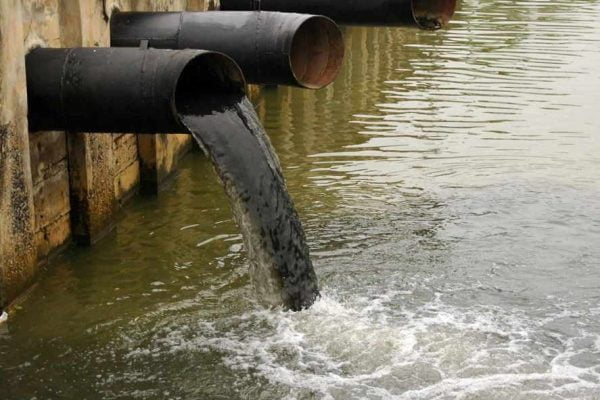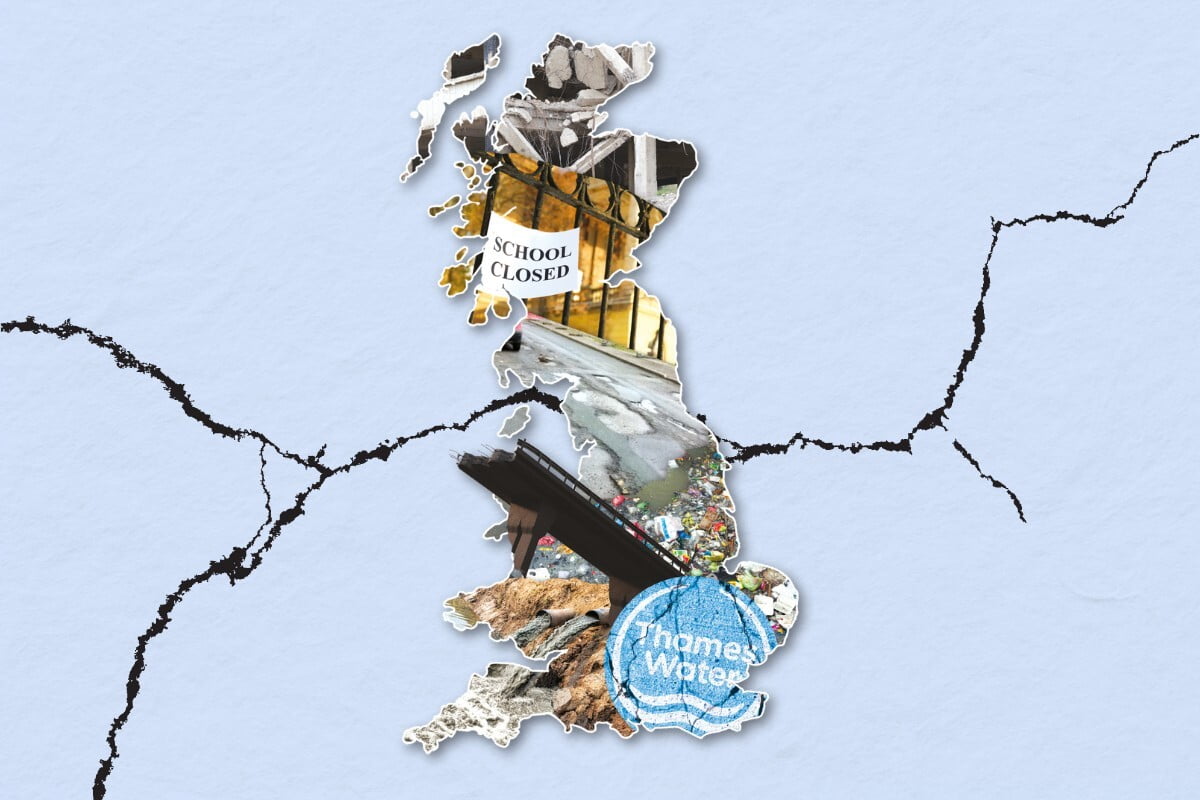‘A stitch in time saves nine’, so the old saying goes. Now, after years of avoiding essential repairs and maintenance, the fabric of Britain’s infrastructure is beginning to unravel.
Last year it was revealed how the lives of thousands of children are at risk from collapsing schools, due to the use of cheap crumbly concrete.
But it turns out that tackling dodgy concrete and making schools safe is merely a pricey starter on a very costly bill when it comes to patching-up broken Britain.

The cost of fixing-up the 600 or so schools with this bubbly concrete is estimated to be over £150m. Yet billions more is needed for the 700,000 pupils who go to school in buildings that need ‘major rebuilding or refurbishment’.
The Department of Education estimates that it needs £5.3bn a year just to maintain school buildings and mitigate the ‘most serious risks’. But it was given just £3.1bn by the Treasury last year. Clearly maths is not the Tory government’s strongest subject.
This is dwarfed by the costs of fixing Britain’s hospitals. NHS England put the bill for essential repairs of the hospital estate at nearly £12bn last year, yet received only a fraction of this money. It’s as if the Tories think they can cure cancer with an aspirin.
Off the rails
Britain’s railways are in a similarly dire state, having been starved of investment for years. The latest figures show over 1,000 trains a day are cancelled, on average, with the problem particularly bad in the north of England.
Yet Network Rail – responsible for track maintenance – has seen its most recent budget cut by £1.2bn. Such is the backlog in maintenance already that industry insiders fear a ‘major incident’ within the next two years.
Frustrations over delays and cancellations, overcrowding, and poor customer service are reaching boiling point. Repeat offenders like Avanti West Coast could even see their contracts being cancelled as a result, with de facto nationalisation of the service brought about, due to perennial problems with the franchise.
Those lucky enough to get a train on time will likely sit (or, in many cases, stand) in carriages that have seen better days. But orders for new rolling stock have been put on hold, as rail companies seek to cut costs. In turn, with demand drying up, thousands of workers are set for the chop at UK train-making factories (see letter below).
There’s an urgent need to invest in extra capacity for Britain’s railway system. Yet the Tory government has massively scaled back HS2, due to spiralling costs.
We’re told that railway construction in Britain is amongst the most costly in the world. What this really means is that, if anything is to be built, the big construction companies, consultants, and landowners all expect a hefty slice of the pie. But British capitalism is unable to provide more than crumbs. And so the rest of us are left starved of decent services and infrastructure.
As for the UK’s roads, the Asphalt Industry Alliance predicts more than half the local network – 107,000 miles – could fail in the next 15 years.
£8.3bn previously earmarked for cancelled sections of HS2 has now been reallocated for road maintenance. But this is only enough to resurface 5,000 miles. Yet 34,000 miles have been identified as ‘structurally poor’, with fewer than five years’ life remaining.
Having kicked the can for years and years, the capitalists are finally running out of road!
Stinking system
Most prominent in the headlines at the moment is the crisis in the UK water industry.
Britain’s sewerage system is flooding our rivers with crap. Parasitic, privatised water companies have sucked the system dry, having loaded themselves up with billions of debt, whilst paying billions to fat-cat shareholders.

Now, due to years of under-investment, the system has literally gone to shit. Having maxed out their credit, companies such as Thames Water are facing bankruptcy. And as ever, it’s left to ordinary people to foot the bill.
It’s estimated to cost anywhere between £350-£600bn to actually stop sewage flooding our rivers. But neither the capitalists nor the government are prepared to stump up this cash. Instead, plans to tackle the crisis simply aim to limit the number of spills to more ‘acceptable’ levels.
The £96bn investment required for even this modest plan is to be covered by massively raising bills for ordinary households. Meanwhile, the capitalists’ profits will be kept high and dry. And in the meantime, we can expect years and years of stinking rivers and beaches.
Make the billionaires pay
None of this is simply the result of carelessness by individual Tory ministers or directors, however. It is the nature of capitalism itself that puts the short-sighted prioritisation of profits above all else.
Whilst millions of us are forced to see our services decay and go to ruin, the multi-millionaires are laughing all the way to the bank.
Starmer’s Labour will inherit this mess. And since they accept capitalism, the rot will continue to spread.
With Britain literally falling apart, it’s only a matter of time until the working class reaches its limit – and presents the bill to the bankers and billionaires.
Rail closures
Capitalism’s crisis, like a row of dominoes, is knocking everything down. Across the country, British industry is failing. Port Talbot is a notable case.
Now Alstom – a major train maker, and owner of the UK’s biggest rail assembly site, located in Derby – has announced that it is ceasing production, putting around 1,300 jobs at risk.
The Labour leaders have suggested that the Tories are to blame; that the government has created an unstable environment for big business, and for rail firms in particular, with job losses as a result.
The Tories have certainly played their part in causing chaos on Britain’s railways. In reality, however, Alstom bosses are closing production not because there’s no money for rail-related companies, but because there’s not enough profit to be made.
If Labour takes power, they will follow every dot and comma of the capitalists’ orders. They will not defend jobs, but will protect profits.
The only way to secure a stable environment for workers is by fighting for a democratically planned economy. We have the resources to feed, house, and employ everyone. What we don’t have is enough to satisfy the rich!
Ben Cownley, Manchester
Private ambulances
While waiting times for NHS ambulances soar, private companies have taken the opportunity to drain as much profit as possible from those nervously awaiting medical attention for themselves or loved ones.
For the price of £99, you can skip the queue with a swanky new ‘MET medical’ ambulance – a company claiming to offer a solution to waiting times, while simultaneously intensifying our two-tier system for healthcare.
In December 2023, patients suffering from suspected heart attacks or strokes were waiting an average of 93 minutes: five times higher than the target response time of 18 minutes.
These target times are set with the aim of preventing brain damage and unnecessary deaths. Every minute without intervention increases the chances of disability.
Those desperately sacrificing their money on private ambulances are preyed upon for profit. Those who cannot afford this, meanwhile, are forced to wait in long queues, risking permanent damage to their bodies.
Rather than improving NHS infrastructure to meet targets, workers are once again being forced to foot the bill for capitalism’s failures.
Leah Harthill, Lancaster
Cuts to parks
When parents want to spend time outside with their children, or a group of teenagers need somewhere to meet, they may head to their local park. Yet for those living in Slough, this may soon become an impossibility.
As part of their 2024-25 budget, Slough’s council has decided to cut playground spending by 156%. Not 56%, not even 100%, but an unbelievable 156%!
This announcement came after the closure of two local parks and an appalling council tax rise of over 8%.
So where is the council spending all their extra money? It’s not going towards public housing, children’s services, or public health – all of which received budget cuts. Instead, it’s going to further fund the police.
With one-in-five councils heading towards bankruptcy in the coming year, the cuts and added police funding in Slough are not exceptions, but premonitions.
How long is it before your council cuts its funding for key services? How long before the only thing they provide is the police walking around your community?
Jessie Small, Reading






